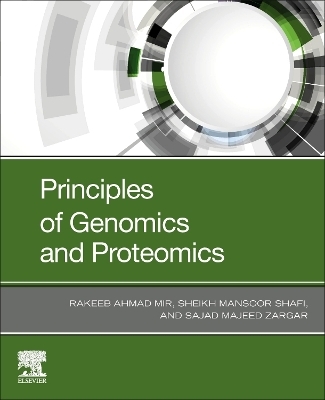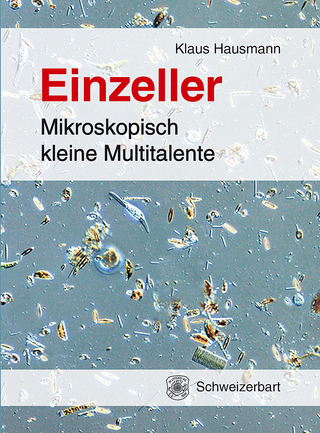
Principles of Genomics and Proteomics
Elsevier - Health Sciences Division (Verlag)
978-0-323-99045-5 (ISBN)
A final proteome analysis is dedicated to functional analysis. Other chapters cover applications of omics technologies broadly. This book is the perfect reference for genetics labs around the world. Graduate students will benefit from the structured and detailed coverage of methods and established researchers will benefit from the book for staff training in research and may find it particularly helpful in enhancing reproducibility of experiments.
Rakeeb Ahmad Mir is Assistant Professor, Department of Biotechnology, School of Life Sciences, Central University of Kashmir, Science Campus, Nunner, Ganderrbal, Srinagar, Jammu & Kashmir, India. He is having 6 years of Research and Teaching Experience in different subjects of Biotechnology. His research interests include Molecular taxonomy, Nematode genomics and basic research in proteomics. In addition, he is deeply involved in teaching courses such as, Cell Biology, Signal transduction and Cancer Biology, Molecular Biology, Genomics and Proteomics and Nematode genomics at University level. Dr Rakeeb has published various research and review papers, book chapters on Molecular taxonomy of nematodes, Proteomic techniques and stress tolerant crop plants. Since he has considerable experience in the related fields pertaining to the title of this book. Dr. Sheikh Mansoor Shafi currently serves as a postdoctoral researcher at the Phenomics Laboratory within Jeju National University in South Korea. His primary research focuses on high-throughput phenomics, remote sensing and precision agriculture. Prior to this role, he held positions as a Postdoc Research Associate at SKIMS Srinagar and as a Project Associate-I at CSIR-Indian Institute of Integrative Medicine Jammu (IIIM). Throughout his academic journey, Dr. Mansoor has had the opportunity to work in reputed laboratories, including the Transcriptomics Labs at SKUAST Kashmir and the Department of Biotechnology and Pathology at Central Institute of Temperate Horticulture (CITH) Rangreth Srinagar. His educational background comprises a BSc degree from SP College of Science (University of Kashmir), an MSc degree from HNBGU Uttarakhand, and a Ph.D. degree from Sher-e-Kashmir University of Agricultural Sciences and Technology of Jammu. Dr. Mansoor has been dedicated to contributing significantly to his field and has displayed a strong commitment to becoming a highly accomplished scientist. His expertise spans various areas, including biochemistry, molecular biology, and genetics. Dr. Mansoor's accomplishments are notable, including over more than 50 research and review papers published in esteemed journals such as Frontiers, Plos One, Scientific Reports, Journal of Fungi (JoF), Planta, Chemosphere, JEMA and Molecules etc. He has also authored 5 books and more than ten book chapters, and holds credit for filing two patent applications. He has showcased his knowledge through guest lectures on topics like sequence assembly, alignment, submission tools, and phylogenetic analysis. He has received practical training in advanced techniques in modern biology and related fields. Dr. Mansoor has been recognized with numerous national and international accolades, including prestigious awards such as Best Thesis, Young Scientist, and recognition for his exceptional oral and poster presentations. He holds membership in a significant big grant (BIRAC) awarded by the Department of Biotechnology (DBT) in India. In addition to his accomplishments, Dr. Mansoor plays an active role as a Review Editor for Frontiers in Ethnopharmacology, and he also contributes as a reviewer for esteemed journals like 3 Biotech, Cell Reports, Frontiers, Plos One, and JARMAP. His unwavering dedication, profound expertise, and active involvement underscore his unwavering commitment to advancing scientific knowledge in his field. Dr. Sheikh Mansoor currently serves as a Postdoctoral Researcher at the Department of Plant Resources and Environment and Subtropical and Tropical Organism Gene Bank within Jeju National University in South Korea. Prior to this role, he held positions as a Postdoc Research Associate at SKIMS Srinagar and as a Project Associate-I at CSIR-Indian Institute of Integrative Medicine Jammu (IIIM). Throughout his academic journey, Dr. Mansoor has had the opportunity to work in reputed laboratories, including the Transcriptomics Labs at SKUAST Kashmir and the Department of Biotechnology and Pathology at Central Institute of Temperate Horticulture (CITH), Rangreth, Srinagar. His educational background comprises a BSc degree from SP College of Science (University of Kashmir), an MSc degree from HNBGU, Uttarakhand, and a PhD degree from Sher-e-Kashmir University of Agricultural Sciences and Technology of Jammu. Dr. Mansoor has been dedicated to contributing significantly to his field and has displayed a strong commitment to becoming a highly accomplished scientist. His expertise spans various areas, including biochemistry, molecular biology, and genetics. Dr. Mansoor’s accomplishments are notable, including more than 50 research and review papers published in esteemed journals such as Frontiers, PLOS One, Scientific Reports, Journal of Fungi (JoF), Planta, Chemosphere, JEMA, Molecules etc. He has also authored 5 books and more than 10 book chapters and holds credit for filing two patent applications. He has showcased his knowledge through guest lectures on topics like sequence assembly, alignment, submission tools, and phylogenetic analysis. He has received practical training in advanced techniques in modern biology and related fields. Dr. Mansoor has been recognized with numerous national and international accolades, including prestigious awards such as Best Thesis, Young Scientist, and recognition for his exceptional oral and poster presentations. He holds membership in a significant big grant (BIRAC) awarded by the Department of Biotechnology (DBT) in India. In addition to his accomplishments, Dr. Mansoor plays an active role as a Review Editor for Frontiers in Ethnopharmacology, and he also contributes as a reviewer for esteemed journals like 3 Biotech, Cell Reports, Frontiers, PLOS One, and JARMAP. His unwavering dedication, profound expertise, and active involvement underscore his unwavering commitment to advancing scientific knowledge in his field. Sajad Majeed Zargar, Ph.D, is currently an Assistant Professor at Sher-e-Kashmir University of Sciences & Technology in India and visiting Professor at University of Padova, Italy. Dr. Zargar is the recipient of the CREST overseas fellowship from DBT, the Goho grant from Govt. of Japan, and the Erasmus Fellowship from European Union. He is also a member and representative of INPPO (International Plant Proteomics Organisation). His editorial activities and scientific memberships include publishing research and review articles in international journals and is also reviewer.
1. Introduction to genomics and proteomics
2. Genome mapping
3. Analysis of genomes-I
4. Analysis of genomes-II
5. Nutrigenomics
6. Analysis of proteomes-I
7. Analysis of proteomes-II
8. Analysis of proteomes-III
9. Analysis of proteomes-IV
10. Beyond genomics and proteomics
| Erscheinungsdatum | 13.02.2023 |
|---|---|
| Verlagsort | Philadelphia |
| Sprache | englisch |
| Maße | 191 x 235 mm |
| Gewicht | 590 g |
| Themenwelt | Naturwissenschaften ► Biologie ► Zellbiologie |
| ISBN-10 | 0-323-99045-2 / 0323990452 |
| ISBN-13 | 978-0-323-99045-5 / 9780323990455 |
| Zustand | Neuware |
| Haben Sie eine Frage zum Produkt? |
aus dem Bereich


